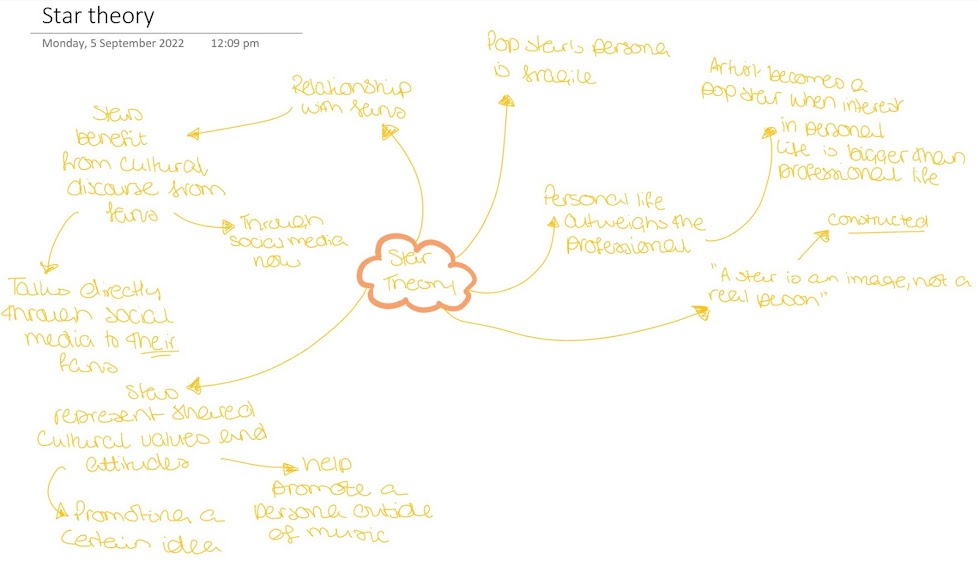Star Theory - Taylor Swift
Richard Dyer's Star Theory - Taylor Swift
Unique Selling Point (USP)
Richard Dyer said that "a pop star's persona is a fragile thing which needs constant nurturing". Taylor Swift has a unique selling point which is the way she uses messages and clues in her marketing and songs to tell a story. This is a Unique Selling Point as it provides discourse between her and her fans, but also tells an overarching story within her albums and reflects herself as a person. An example of this is in Swift's branding for her album 'Red'. The album was first released in 2012 but was then re-released in 2021 with the subtitle of 'Taylor's Version'. This was a part of Taylor Swift's campaign to re-release her albums that weren't under her own label - meaning she did not own them. This is a Unique Selling Point as it means that Swift's fans (labelled as 'Swifties') are able to listen to the re-released album (along with its added new songs) and are able to feel more connected to the artist as she gains her own label for her work. This is a clever USP as it allows for a 'rebranding' of Swift's identity and image, as well as changes of her own original songs with the famous 10 minute version of her song 'All Too Well'.
Ideologies
Taylor Swift's ideologies were something that she didn't truly express to her fans or the world before recent years, however this is something she is now more vocal about in her career, since 2018, when she endorsed Phil Bredesen, the Democratic candidate for Senate in her home state of Tennessee. Since then, the star has been more vocal about what is going on in the world especially during the release of her 7th album 'Lover' in 2019. An example of one of her ideologies being conveyed was in her song 'You Need To Calm Down', a song about self-love and equality for the LGBTQ+ community - which she donated to around the single's release. Swift has also shown her political ideologies in making donations to the victims of gun violence and for the 'March For Our Lives' campaign. These ideologies are conveyed in Swift's music through lyrics, but also outside of them through the use of her platform on social media.
Altogether, these are ideologies that do conform to the current cultural ones but Swift is also known for questioning the representation of the young female star in the media. Some examples of this are included in her song 'Mad Woman' from the album 'Folklore', released in 2020. This is a song that argues that the way women are treated in the celebrity industry is unfair, and that they are ridiculed if they show emotional responses to this treatment.
Representation
Richard Dyer's theory states that a star's representation is created through a variety of different texts to show different aspects of their personality or 'brand'. For Taylor Swift, this is shown through her different albums or 'eras' throughout her career as a songwriter.
For her debut album in 2006, we have the innocent country girl next door. This is a pastiche brand that derives from older country artists' styles such as Dolly Parton or Carrie Underwood, and helped Taylor comfortably begin her career in the 'country' genre.

We then see the release of her 2014 album '1989,' which falls into the pop genre. In her music video for 'Shake It Off,' We see the representation of the fun side of Taylor, as opposed to the fem fatale representation of 'Bad Blood.'
In her 2017 album 'Reputation,' we see Taylor take back a darker brand reflecting the online abuse she received from fans and other stars such as Kanye West and Kim Kardashian. Because of their affect on her reputation, she had to create a new brand that reflects her 'rise back from the dead', as represented in her music video for 'Look What You Made Me Do'. Here, Taylor literally rises from the dead, implying that as a star she is able to control her own mortality, an idea that we as an audience receive from this.
In contrast to this, in her 2020 sister albums 'Folklore' and 'Evermore,' Taylor takes inspiration from folk music and her country routes to create a natural, intimate persona. These albums were released at the beginning of the Covid-19 pandemic and revolve around a series of fantastical narratives which Taylor used as escapism during the lockdown. Here, another new side of Taylor's representation is built through a series of new texts. She is presented as peaceful and happy with who she is. This is something that she realised at this point in her career through refusing to give in to the societal expectation for female stars to re-invent themselves with every new album. Here, we see a more 'real' version of Taylor Swift.
'Folklore'
'Evermore'
Finally, here we see the realest version of Taylor Swift, through who she is as 'the good friend', 'the fan' and average 33 year old woman. When her fans on TikTok see her talking about the star Phoebe Bridgers and going out and getting drunk/embarrassed about her 'drunk self', they see her as 'real' and relatable, as if they know her personally.
@taylorswift I cringe but I miss her. Your move @phoebe bridgers ♬ Nothing New - Taylor Swift
Conclusion
Ultimately, from these different texts, we build a 3D idea of who Taylor Swift is and how she is represented in different ways through them. With every new album there is a different 'era,' something she uses to almost create different characters with personalities. This is especially evident in her marketing for her 'Eras Tour,' which she began in March 2023 and celebrates her past 10 albums. This is also something she reclaims to a further extent as she releases her re-recorded versions of her first 6 albums. Therefore, out of a patchwork of texts, including social media, music, music videos, interviews and photos, we understand her as an audience. Ultimately, this fits with Richard Dyer's 'Star Theory,' which revolves around a celebrity's persona and Unique Selling Point, and how they share this with their fans.








Comments
Post a Comment